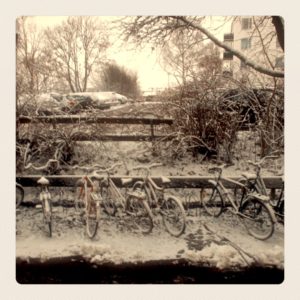 Hej! Well, it’s officially the run-up to Christmas now, and as a result suddenly huge Christmas trees are being placed all around Uppsala, lights are going up, shop windows have become explosions of red, gold and green, and everywhere you see offers on glögg (traditional Swedish mulled wine) and lussekatter (Lucia buns… more on that later!). It is almost getting too cold and icy for people to cycle – which luckily makes no difference to me, being one of maybe three students in Uppsala without a bike. It is this absence of a bike which has actually inspired this week’s article on the Swedish verbs att gå and att åka: verbs with an everyday use, but which are, at least for me, so easy to mix up!
Hej! Well, it’s officially the run-up to Christmas now, and as a result suddenly huge Christmas trees are being placed all around Uppsala, lights are going up, shop windows have become explosions of red, gold and green, and everywhere you see offers on glögg (traditional Swedish mulled wine) and lussekatter (Lucia buns… more on that later!). It is almost getting too cold and icy for people to cycle – which luckily makes no difference to me, being one of maybe three students in Uppsala without a bike. It is this absence of a bike which has actually inspired this week’s article on the Swedish verbs att gå and att åka: verbs with an everyday use, but which are, at least for me, so easy to mix up!
Both gå and åka can be translated into English as “to go”, and this where most problems arise; especially with gå sounding so much like the English, making it tempting to use it all the time and forgetting about åka completely! However, in doing so, you would essentially be telling people that you walk everywhere… leading them to possibly thinking you had given up on all modern methods of transport and decided to live like you are from another century – not really the best impression to give, I am sure you will agree! The general rule is, with gå, if you are referring to a person or people, it means travelling by foot, – åka is the verb to use if you are using something else to help you get there (åka cykel – to go by bike; åka bil – to go by car; åka skidor – to ski).
However, gå can also be used when referring to inanimate objects and not people to refer to movement. For example, you can ask “Går det här tåget till Stockholm?” (“Does this train go to Stockholm?”) without any problem; likewise “Hur går det med dig?” (“How are things?”) has nothing to do with if someone is able to walk, but just generally how things are going in life.
One final (although not especially recommended) alternative a close friend of mine often uses on forgetting that gå can mean going by foot, is promenera: it often brings a smile to people’s faces being told that they must stroll or promenade along the platform to find their train! Until next time – hej då!

